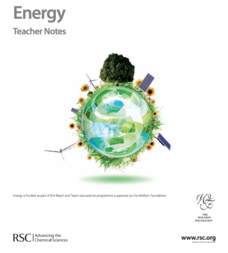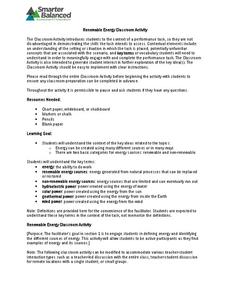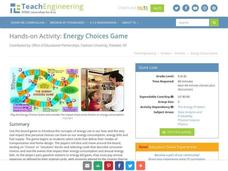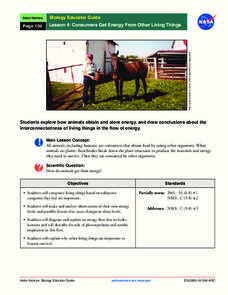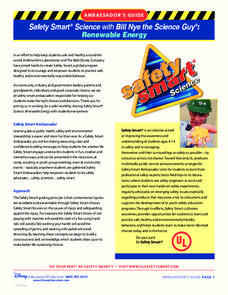Royal Society of Chemistry
Energy—Gifted and Talented Chemistry
What has more energy than a room full of pupils after a fire drill? This lesson plan! Explore the changes in energy during different chemical reactions, discover why some reactions feel cold and others feel hot, and tackle the concept of...
Cornell University
Energy Changes in Chemical Reactions
The heat of solution measures how much thermal energy a dissolving substance consumes or gives off. The experiment demonstrates both endothermic and exothermic reactions. Scholars dissolve several substances, measure the temperature...
Smarter Balanced
Renewable Energy
Renewable and non-renewable energy sources are the focus of a series of activities that prepare learners for a performance task assessment on energy. Groups identify the various sources of energy and classify these sources as either...
Teach Engineering
Energy Systems
Is electricity created in the outlet? Using posters of several energy systems, collaborative groups identify and describe the parts of their systems. The groups also look at the environmental impacts of the systems and present their...
Teach Engineering
Energy and the Pogo Stick
Let your class bounce to examine the concept elastic potential energy. Individuals bounce on a pogo stick in order to calculate its elastic potential energy. Groups then compare the elastic potential energy to the gravitational potential...
National Energy Education Development Project
Great Energy Debate
If someone yelled for eight years and eight months, they could produce enough energy to heat one cup of coffee. A lesson on energy encourages scholars to research 10 different energy sources in groups before playing a game. Twenty...
NOAA
Oceans of Energy
Are the earth's oceans really just giant batteries, waiting for their energy to be harnessed? Middle school mechanical engineers will be shocked by the amazing amount of energy that forms around them after diving into part four of a...
Teach Engineering
Energy in Our Lives Carousel
Don't waste any more energy trying to find a great resource on energy. The third installment of a 25-part Energy Systems and Solutions unit focuses on energy use in pupils' lives. They consider how their daily routines consume energy and...
Teach Engineering
Energy Intelligence Agency
Protect the world from energy depletion—join the Energy Intelligence Agency. Using a set of cards, pupils distinguish between correct and incorrect information regarding energy use in the United States. They analyze graphs and diagrams...
Teach Engineering
Energy Storage Derby and Proposal
Small groups use the engineering design process to build and test a vehicle capable of carrying 250 grams a distance of five meters. The design must allow for the storage of potential energy and turn it into motion, allowing the...
Teach Engineering
Energy Choices Game
Here's a fun game on a very serious matter. Scholars play a board game to learn about personal energy use and consumption. They see how various choices affect their energy use and costs, and then apply this knowledge to brainstorm ways...
Serendip
How Do Biological Organisms Use Energy?
When an organism eats, how does food become energy? Young biologists follow glucose through the process of cellular respiration to the creation of ADP using a discussion-based activity. The resource also highlights conservation of mass...
Teach Engineering
Optimize! Cleaner Energy Options for Rural China
What are the trade-offs when looking to get the most benefit from an energy source? Small groups compare the cost-to-emission levels of several energy sources by looking at the information graphically. The groups utilize this information...
Curated OER
Roller Coasters
Twisting and turning through the sky, roller coasters are popular attractions at amusement parks around the world, but how exactly do they work? Explore the physics behind these thrilling rides with an engineering design activity....
NASA
Consumers Get Energy From Other Living Things
How do plants and animals get their food? Learn about where energy comes from, how animals store energy, and aerobic respiration, in a lesson that allows scholars to diagram energy flows.
University of Georgia
Energy Content of Foods
Why do athletes load up on carbohydrates the evening before a competition? The lesson helps answer this question as it relates the type of food to the amount of energy it contains. After a discussion, scholars perform an experiment to...
Disney
Renewable Energy
Bring some energy to your physical science curriculum with this engaging Bill Nye the Science Guy activity. Based on his Renewable Energy video, students explore the concepts of potential and kinetic energy and learn how they are applied...
Bonneville
Introduction to Energy
Transform the classroom with energy. Pupils learn about different types of energy and practice identifying the types in the first lesson of six in a solar versus wind energy unit. The class sees examples of how one type of energy can be...
Foundation for Water & Energy Education
How is Flowing Water an Energy Source? Activity C
Can the force of falling water through a tube vary by altering the diameter of the tube or its height? That is what physical scientists aim to discover in this activity, the third in successively more revealing activities on the power of...
Bonneville
Home Energy Audit
Reduce energy consumption and save some money at the same time! The third of seven installments in the A Community Powered by Renewable Energy unit focuses on energy use in the home. Learners investigate the energy needs of small and...
NASA
Earth’s Energy Budget - Seasonal Cycles
Earth's energy budget should be in the red. Young researchers review satellite data in a presentation to study Earth's solar radiation. They make both qualitative and quantitative observations about variations in available seasonal...
NEED Project
Calibrating Thermometers
Engage young scientists in the upper-elementary and middle school grades with this collection of simple experiments. Whether you're teaching about heat transfer, density, or potential energy this resource has a lab for you.
Bonneville
How Much Energy Do YOU Use?
Determine the power hog in the house. Pupils learn the difference between power and energy before participating in a hands-on activity. Using a power meter, pairs measure the actual power used for several household devices, estimate the...
Forest Foundation
Exploring Heat & Energy
How does fire keep itself going? Explore the ways that heat uses fuel and energy with a lesson about the fire triangle and combustion. Several activities demonstrate how heat moves from warmer objects to cooler objects, as well as the...
Other popular searches
- Potential and Kinetic Energy
- Energy Pyramid
- Renewable Energy
- Energy Transformation
- Forms of Energy
- Kinetic Energy
- Energy Transfer
- Thermal Energy
- Heat Energy
- Solar Energy
- Solar Power
- Potential Energy


